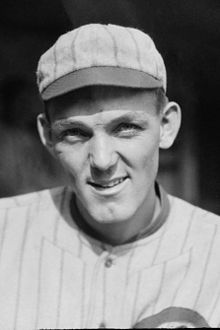|
Buck Weaver
George Daniel "Buck" Weaver (August 18, 1890 – January 31, 1956) was an American shortstop and third baseman. He played in Major League Baseball (MLB) for the Chicago White Sox. Weaver played for the 1917 World Series champion White Sox, then was one of the eight players banned from the Major Leagues for his connection to the 1919 Black Sox Scandal. Baseball careerWeaver was born in Pottstown, Pennsylvania, to Daniel Weaver and Susan Snell and began his major league career on April 11, 1912, as a shortstop for the White Sox. Weaver switched to third base in 1917 after Swede Risberg joined the team.[1] An excellent fielder, Weaver was known as the only third baseman in the league against whom Ty Cobb would not bunt.[2] He led the majors in sacrifice hits in 1915 and 1916.[3] In the famous 1919 World Series, Weaver batted .324, tallying 11 hits.[4] After the Series was over, many suspicious reporters made allusions to a possible fix. However some sportswriters praised Weaver for his efforts all along during the World Series. Ross Tenney of the Cincinnati Post wrote:
Despite this, Weaver was banned by Commissioner Kenesaw Mountain Landis for having knowledge of the fix and failing to tell team officials.[7] Reinstatement attempts Weaver successfully sued White Sox owner Charles Comiskey for his 1921 salary. When Shoeless Joe Jackson did the same, the jury voted 11–1 in favor of Jackson. However, the judge set aside the jury verdict after Comiskey produced Jackson's grand jury testimony about the fix. Despite this success, however, Comiskey made no attempt to offer the confessions as evidence to obtain a similar ruling against Weaver.[citation needed] Weaver applied six times for reinstatement to baseball before his death from a heart attack on January 31, 1956, at the age of 65. The first time was on January 13, 1922, when Weaver unsuccessfully applied for reinstatement, which was rejected by Landis. One notable attempt to get reinstated came in 1927 in the wake of Tris Speaker/Ty Cobb betting scandal. Once again, Landis rejected it, with Landis telling a group of Weaver supporters that his presence at the meetings with the gamblers was sufficient to bar him.[8] After this attempt failed, Weaver returned to Chicago and decided to play in the minor leagues again. Later in life, Weaver contacted a New York City attorney who vowed to get him reinstated. Weaver sent his legal papers and correspondence to New York; however, they were never returned. To this day, baseball historians have been unable to find Weaver's legal files.[5] In 1953, just three years before his death, Buck applied for reinstatement one last time to Commissioner Ford Frick, which was ignored. The letter Weaver wrote to Frick is prominently displayed in Cooperstown’s Baseball Hall of Fame and Museum.[9] Legacy Many parts of the story portrayed in the 1988 movie Eight Men Out are told from Buck Weaver's point of view, with Weaver being played by John Cusack. Harry Stein also used Weaver as a co-narrator in his critically acclaimed Black Sox novel Hoopla (1983), where Stein's Weaver reiterates that his loyalty to his teammates compelled him not to inform baseball authorities about the Series fix.[citation needed] With the 2005 World Series set to begin and the White Sox about to capture their first championship since 1917, Chicago Tribune columnist Mike Downey implored Commissioner Bud Selig to rescind Weaver's ban. His column of October 20, 2005, cited catcher Ray Schalk's condemnation of "the seven" Sox in on the fix, not eight. Weaver's niece, Pat Anderson, told Downey: "You can't understand why someone else would be so obtuse. Some of these commissioners, it's like they put a brown paper bag over their heads."[10] Another niece, Margarie H. (Cook) Follett, came to the 2003 All-Star Game at the White Sox park to personally appeal to the commissioner for her uncle's reinstatement. The Tribune reported a quote from Weaver: "There are murderers who serve a sentence and then get out. I got life."[11] See also
References
External linksWikimedia Commons has media related to Buck Weaver. |
||||||||||||||||||||||||||||||||||||||
